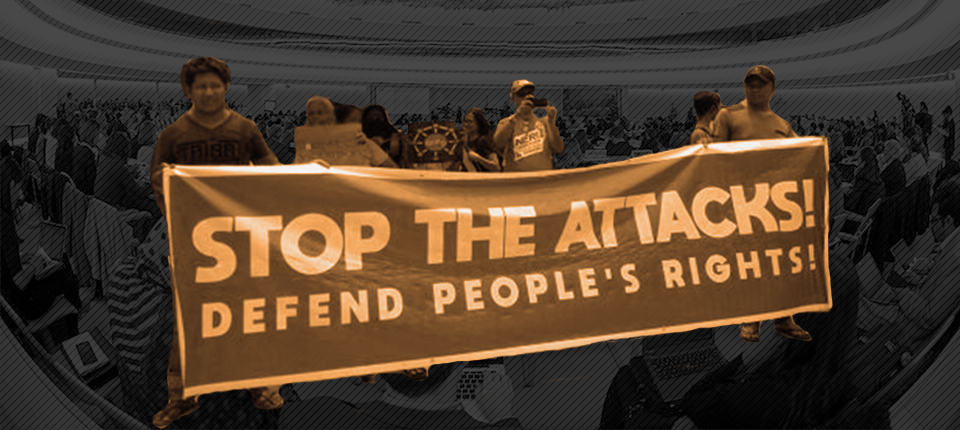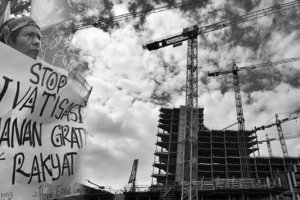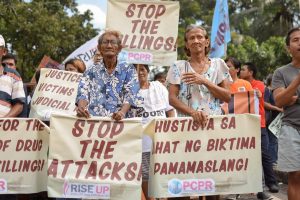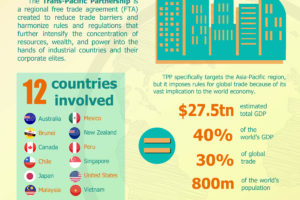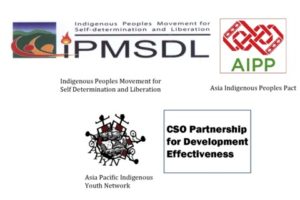[[{“type”:”media”,”view_mode”:”media_original”,”fid”:”2250″,”attributes”:{“alt”:””,”class”:”media-image”,”height”:”430″,”style”:”width: 600px; height: 269px;”,”typeof”:”foaf:Image”,”width”:”960″}}]]Photos in composite: Bulatlat.com, United Nations
IBON International Statement
9 July 2019
IBON International joins the ranks of civil society organisations (CSOs) and rights defenders in supporting international efforts for the defence of people’s rights in the Philippines.
We support the calls to approve, by July 12, a draft resolution that takes to task the deteriorating rights situation in the Philippines, as initiated by the representative of Iceland at the 41st session of the UN Human Rights Council (UNHRC). The draft resolution has earlier seen the support of 28 countries at the UNHRC. It expresses concern on a plethora of rights violations—from intimidation of rights defenders and civil society, arbitrary arrests, enforced disappearances to extrajudicial killings—and urges the Philippine government for measures to prevent extrajudicial killings, hold perpetrators accountable, and calls for its cooperation with the UNHRC for country visits.
We decry the Philippine government’s rejection of the Iceland resolution as “divisive” and as a “hostile action.” The Philippine delegation at the UNHRC was even reported to have walked out of the sessions, with one supposedly calling rights defenders “treacherous.” The government misuses the principle of sovereignty in its attempt to be shielded from international scrutiny, let alone accountability, while actually reinforcing unequal agreements and surrendering resource rights to global powers.
With the Duterte administration on its third year, the so-called “war on drugs” and Martial Law in the whole southern island of Mindanao continues to affect the rights situation. But other measures also pose obstacles to people’s rights, such as Memorandum Order No. 32 (MO32) that put Negros, Bicol and other provinces in a “state of emergency” and Executive Order No. 70 to “end local communist armed conflict” that has been used against rights defenders in the guise of apprehending armed Maoist fighters.
The so-called “war on drugs” has killed thousands, with the former police chief reserving callous remarks for the killing of a 3-year old in the operations. Martial Law in Mindanao has meant at least 67 killings, and 140 cases of attacks on indigenous peoples’ community schools. With the country considered among the worst for workers, unionists have been jailed on dubious charges or killed.
Recently, the killings of rights defenders have been especially alarming. Areas covered by MO32 such as Negros and Bicol regions have been flashpoints. Local campaigners saw at least 69 extrajudicial killings against rights defenders in Negros by early July 2019, including a series of “summary executions” against farmers and land rights advocates. Questionable arrests of at least 71 were also documented. In Bicol region, rights defenders as young as 22 and as old as 69 years of age have been killed.
All these deprive rights defenders and people’s organisations their basic democratic rights. These severely hamper their right to call for accountability, let alone their right to participate in shaping development processes and governance. All in all, 213 farmers, indigenous peoples and land rights advocates have been killed since the start of the administration, with the figure rising to 384 when including activists in general.
Amid a worsening rights situation, high ranking military officials have taken to filing perjury cases against rights defenders, while rights groups have been denied by courts to be protected from military harassment and “red tagging”. Despite growing evidence and efforts to exact accountability, impunity remains the norm while the presidency misleadingly insists that it “respects human rights.”
We call on the international community to strengthen efforts to hold the Philippine government accountable and serve justice to victims and their kin. We urge states at the UNHRC to support the adoption of the resolution towards investigations and measures for justice.
Other international CSOs have already released reports on “state executions” in the so-called “drug war,” and have called for support for rights defenders amid ongoing vilification campaigns. We enjoin civil society organisations, people’s organisations, and progressive parliamentarians to support the efforts of Philippine and international organisations, such as the Philippine Universal Periodic Review (UPR) Watch and the International Coalition for Human Rights in the Philippines (ICHRP), against state-led violence and impunity, for the reversal of shrinking democratic spaces, and for the respect, defence and realisation of rights in the Philippines. #
